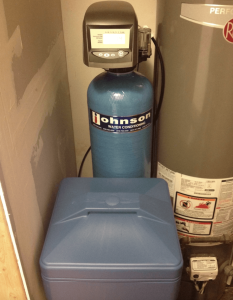How Can a Water Softener Help Your Water Pipes? A Pentair Water Softening Company in Batavia, Illinois Explains

Hard water is characterized by excess amounts of calcium and magnesium. These two particles can cause a host of problems when contained in water — not the least of which is water pipe buildup.
Fortunately, water softeners exist, and they can go a long way in preventing buildup inside your pipes. Are you into and learning how? This Pentair water softening company in Batavia, Illinois is going to explain below.
How Does Hard Water Affect Your Water Pipes?
As we mentioned, hard water is filled with excess amounts of calcium and magnesium. These two minerals are not unsafe for consumption. However, when they pass through water pipes, they tend to cling to the pipes’ interior walls.
Over time, they accumulate, causing the pipe to become narrower and narrower. The narrower they become, the harder it is for water to pass through them. This results in reduced water pressure.
After some time, calcium and magnesium particles can accumulate to the point where they close off a pipe entirely. When this occurs, water flow will cease, and the pipes need to be replaced. Replacing water pipes is an intensive process that typically costs several thousands of dollars.
Fortunately, you don’t have to let it reach this point. You can keep calcium and magnesium from inundating your water pipes by having a water softener installed by your local Pentair water softening Company in Batavia, Illinois. The water softener will remove the excess calcium and magnesium, thereby eliminating internal pipe buildup.
How Does the Water Softener Remove Calcium and Magnesium?
Now that we’ve discussed the importance of the water softener in keeping your water pipes clear, let’s talk about how the water softener operates. As you are now aware, these systems are designed to remove calcium and magnesium from a water supply. But how do they do this?
This is done through a process called ion exchange. This is when positively charged ions swap places with negatively charged ions. When it comes to the water softener, sodium ions swap places with calcium and magnesium ions, in particular.
This is facilitated by a series of resin beads. These are contained within the water softener’s tank, and they are used to hold sodium ions. When water comes through the water softener, these sodium ions leave the resin beads, making space for the calcium and magnesium particles in the water to cling to them instead.
By the time the water has left the water softener, it’s entirely free of calcium and magnesium. While it does contain small amounts of sodium, the amount is so small as to be negligible. In other words, the sodium doesn’t affect the quality of the water.
Because the water no longer contains calcium or magnesium particles, it can no longer cause internal pipe buildup. In essence, the water softener will protect your water pipes for as long as it remains operational.
To keep a water softener operational, you simply need to load it with softener salt every one to two months. Do this regularly, and you won’t have to worry about calcium or magnesium being in your water ever again.
Interested in installing a water softener for the purpose of protecting your water pipes? If so, your local Pentair softening company in Batavia, Illinois can help. They’ll not only supply you with a water softener, but they can install it for you as well.
Looking for a Pentair Water Softening Company in Batavia, Illinois?
Are you ready to protect your water pipes by installing a water softener? Ready to have it installed by the best Pentair water softening company in Batavia, Illinois? If so, look no further than the team at Johnson Water Conditioning. Contact us today to get started.

 Better Water for
a Better Life
Better Water for
a Better Life
